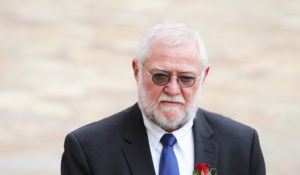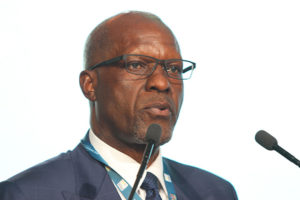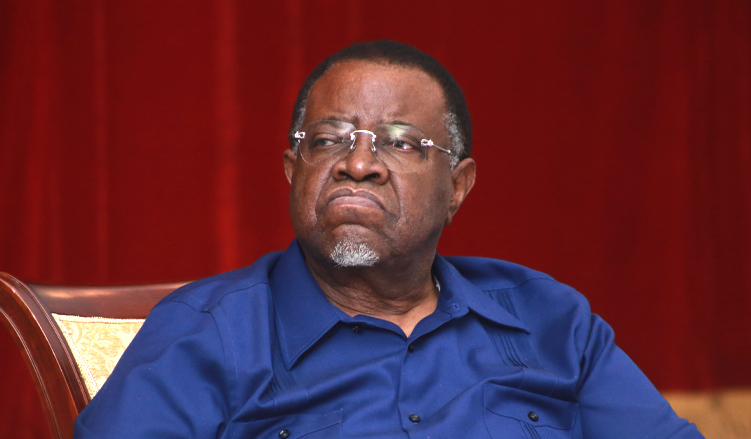By Sakeus Iikela and Shinovene Immanuel | 11 December 2019
PRESIDENT Hage Geingob told Cabinet ministers who publicly condemned the Fishrot scandal to resign if they don’t trust how the government is dealing with the matter.
Geingob made these threats on Friday during the last Cabinet meeting of the year.
Finance minister Calle Schlettwein, mines and energy minister Tom Alweendo and public enterprises minister Leon Jooste last week condemned the Fishrot scandal that is estimated to involve as much as N$2,5 billion in questionable fishing deals and bribes.
It appears their boss was not happy with them going public about their outrage.
Geingob, sources said, made his feelings known at the Cabinet meeting, saying there are some ministers attacking former ministers Bernhard Esau and Sacky Shanghala, despite their resignations.
“You are behaving like you are cleaner than others. You are criticising how the [Fishrot] case has been handled,” Geingob said.
The president added: “If you are not happy with how the case is being handled, then why don’t you just resign?”.
Questions sent to presidential spokesperson Alfredo Hengari on Monday were not answered. The Namibian confirmed this version of events with more than three people briefed about this matter.

Finance minister Schlettwein was the first top politician to criticise the fishing scandal on 1 December 2019 via his Twitter account.
“The Al Jazeera video shows a typical case of resource looting from a developing country (Namibia) by a multinational company with the involvement of a few highly placed and influential Namibians. It is criminal. All must be prosecuted. The process has started, must be completed,” he stated.
Energy minister Alweendo posted on his Twitter account on 4 December that “the recent revelation about the plundering of our fisheries resources that is known as “Fishrot” is reprehensible, and needs to be condemned by all of us. What makes it even more deplorable is the fact that it was perpetrated by those entrusted with public office leadership”.
Alweendo added that this scandal is a sign that corruption is more endemic than has been acknowledged, and ‘that we as the government and trustees of public interest need to be more vigilant. Namibia, a country with vast natural resources, is vulnerable to exploitation in other sectors”.

“Let us demand that the institutions responsible for holding us accountable will leave no stone unturned in their investigations, and ensure that those responsible are held accountable. Namibia is the only country we have, and we need to protect its interests and its people,” he said.
Public enterprises minister Jooste also joined the fray by posting on Twitter on 5 December, saying he was “personally devastated” by the scandalous corruption involving his former colleagues “when I consider the social, financial and reputational consequences of these actions”.
“Corruption is like stealing, and whether one steals N$1 or N$1 million, it’s all the same, and equally wrong. I’m proud of Namibians sharing their disgust and anger, and I believe that we have the corporate ability to turn a negative experience into a positive solution,” he said.
The minister also called on members of the public to send him recommendations on how to root out corruption in the public sector.
“Corruption starts with two parties – one paying and the other receiving, and both are equally guilty. I often hear people saying that certain officials dealing with the public are generally corrupt. If that’s true, it means that the same number of citizens are corrupt,” Jooste added.
Geingob showed signs of being in denial on how corruption is entrenched in the government system.
In fact, he based his assessment of the level of corruption in Namibia on the fact that only two people brought up the issue of corruption during the president’s countrywide townhall meetings, where questions were dictated by the Presidency.
“You may recall that during the townhall meetings, the issue of corruption was only raised twice. This is why I believe that corruption is not systemic in Namibia, but perceptions have been created that Namibia is a corrupt society,” Geingob said.
The Namibian understands that the Fishrot scandal implicates Swapo and possibly the election campaign that voted Geingob into power at the last congress.
This is not the first time that Geingob is pushing his ministers to resign.
He told former deputy land reform minister Bernadus Swartbooi to resign in 2017. Swartbooi – who is now heading to parliament under his new party Landless People’s Movement – at the time took issue with land reform minister Utoni Nujoma.
Swartbooi branded Nujoma an idiot, greedy, and accused him of raping the Constitution.
The Namibian also reported in 2017 that former justice minister Shanghala threatened to resign that year after he and former fisheries minister Bernhard Esau opposed phosphate mining, which is indirectly being pushed by Geingob.
FROZEN
Meanwhile, Anti-Corruption Commission director general Paulus Noa has declined to comment on whether Shanghala and bribery accused Tamson ‘Fitty’ Hatuikulipi’s bank accounts have been unfrozen.
The bank accounts were frozen two weeks ago in the wake of a fishing kickback scandal exposé.
Noa referred The Namibian to the Financial Intelligence Centre and the office of the prosecutor general for more information.
By law, the Financial Intelligence Centre can order the suspension of bank accounts for 12 days.
After that, the prosecutor general can apply for bank accounts linked to money-laundering and crime to be frozen.
Alweedo, Jooste and Schlettwein all declined to comment.






